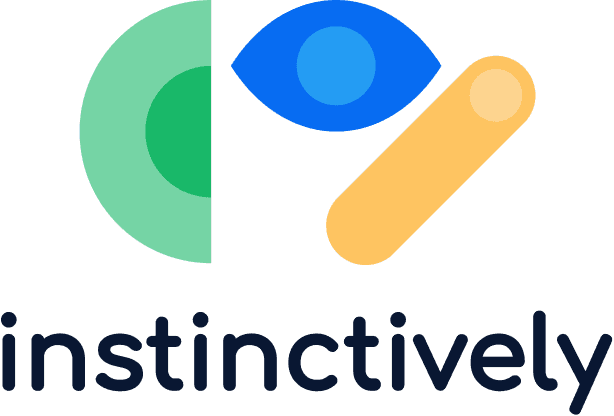Harnessing assistive technology to guide people living with dementia through personalised tasks of daily living using sensory stimulation and providing moments of respite for carers.
BIMA Award winner | Alzheimer’s Society Partner
Instinctively, a partnership with Alzheimer’s Society
Client
Self-led R&D
UX/UI Designer
2021-2024
Role
Year


Harnessing assistive technology to guide people living with dementia through personalised tasks of daily living using sensory stimulation and providing moments of respite for carers.
BIMA Award winner | Alzheimer’s Society Partner
Instinctively, a partnership with Alzheimer’s Society
UX/UI Designer
Role
Self-led R&D
Year
2021-2024
Client




Harnessing assistive technology to guide people living with dementia through personalised tasks of daily living using sensory stimulation and providing moments of respite for carers.
BIMA Award winner | Alzheimer’s Society Partner
Instinctively, a partnership with Alzheimer’s Society
Client
Self-led R&D
UX/UI Designer
2021-2024
Role
Year




Instinctively is designed to help to combat the loss of autonomy experienced by people living with dementia (PLWD). The early stages of the disease can be a difficult period to tackle, especially around the time of medical diagnosis. The cognitive decline experienced by PLWD can bring about complex issues for the individual affected as well as their carers (be that family members or professional carers).
Intro
To create a digital assistive service that provides both PLWD and their carers with apps that help them to manage daily tasks independently. The PLWD's app provides bespoke cues that guide them through completing tasks such as making lunch, taking a shower etc. The carer's app can be used to add, modify and track task completion, allowing them to provide care without needing to be present at all times. This results in a sense of independence for PLWD and reassurance for the carer.
Goal
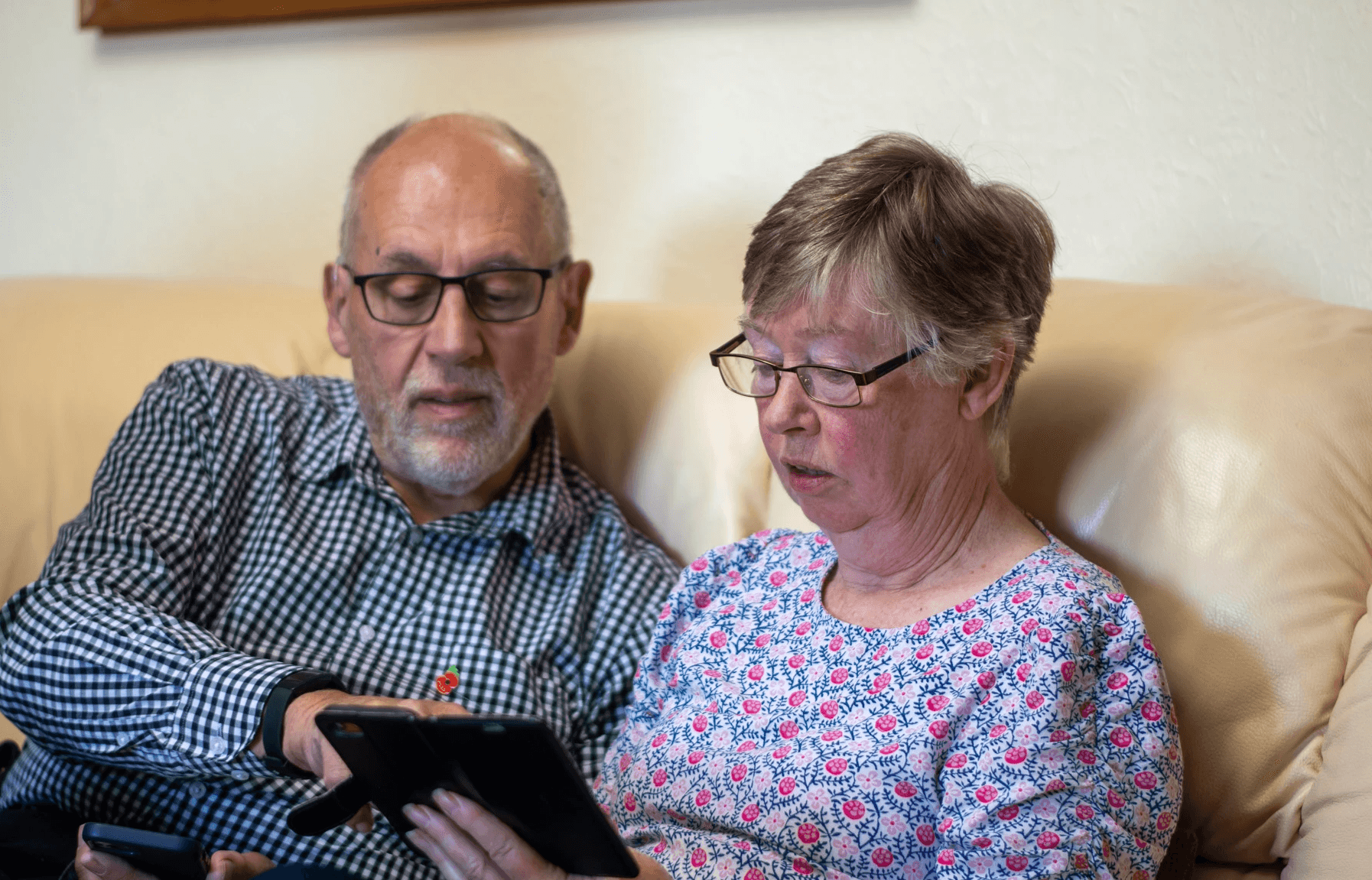

80k funding
Alzheimer's Society 2023 Accelerator
Testing
2x round of 6 week testing a POC product with people living with dementia
BIMA Awards 2023 Winners
Bronze in the Health & Wellbeing category
Gold in the Trailblazers and Social Good categories
Instinctively was started as an R&D project in which my colleague and I started exploring the issue dementia poses to people living with the disease and their carers. With personal experience we knew there was a need for an intervention. Using our design and UX experience we decided to focus on a digital service with the aim of creating a POC that we could test with people with lived experience.
In 2022 we applied for the Alzheimer's Society's Accelerator Programme and in 2023 were successful in securing a 12-month partnership and £80k to develop our idea. The aim was to test and prove our concept and to create a commercially available product that could be recommended to older adults by professionals in order to maintain cognitive health and as a means to manage the decline for those post-dementia diagnosis.
Instinctively became the first R&D project at Else to receive external funding and was given the space and resources to use our research to explore a viable product.
Background


Through Alzheimer's Society we were able to conduct further research and attend events like the annual Alzheimer's Society conference, allowing us to speak to people with lived experience and professionals in the field. We were assigned a panel of PLWD and their carers that we were able to co-design Instinctively with during online and in-person workshops.
Our research led us to the science of Procedural memory - the memory which allows us to act out of instinct and which is the last to us as dementia advances. This paired with our research into habit formation led us to focus on creating ways for PLWD to establish and maintain routines to slow down the progression of dementia.
As a result of the isolation caused by the COVID-19 pandemic we learnt that older adults have become more accustomed to using their phones, tablets and computers to complete tasks such as online grocery shopping and messaging family and friends. This willingness to adopt technology in their daily routines highlighted that the technological barrier of a digital product like Instinctively would be less difficult to overcome as we first thought.
Events and networking
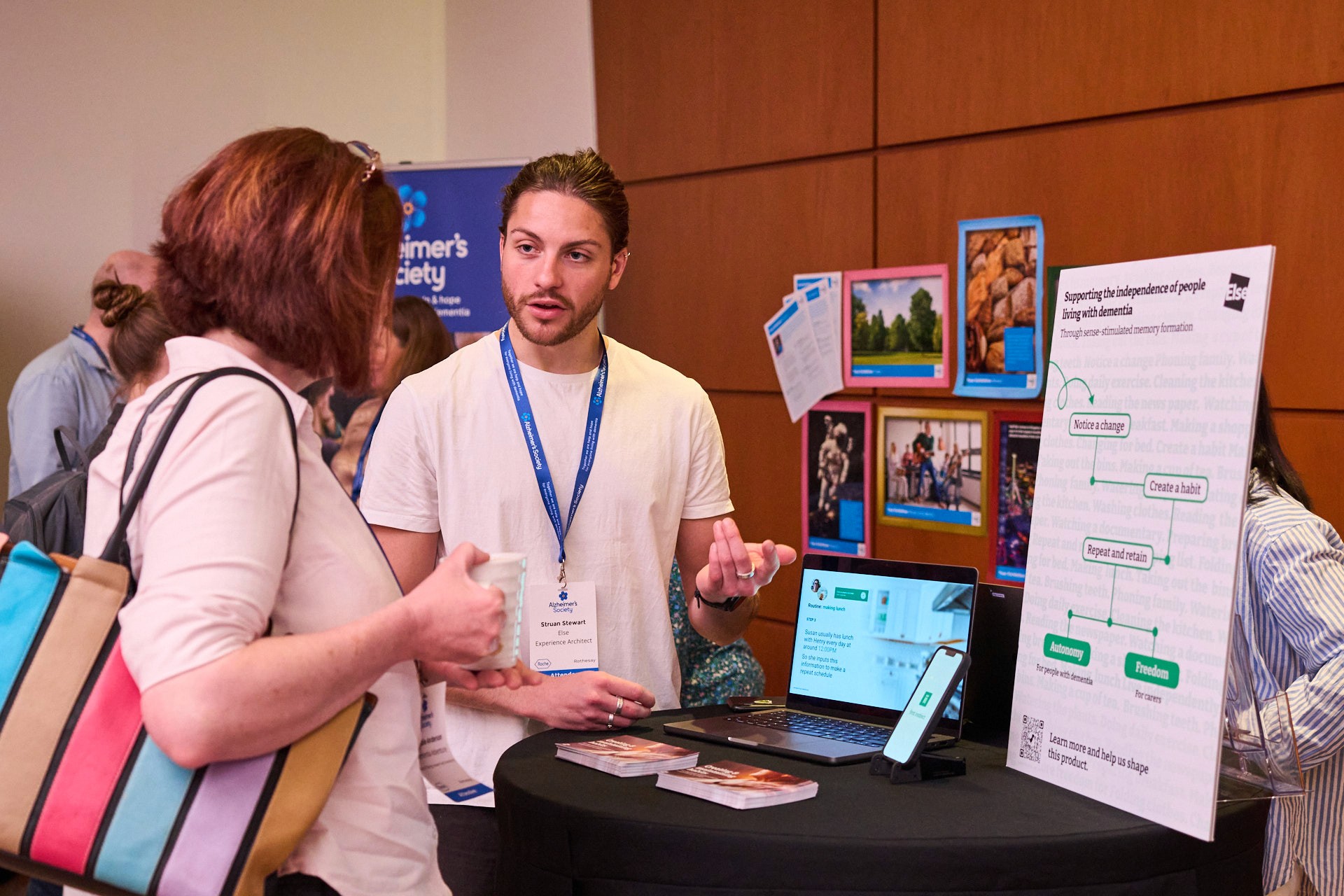

The funding from Alzheimer's Society was used to hire a development team to help us bring Instinctively from a working prototype to an app in Test Flight that we could use to conduct tests with PLWD and their carers. This brought another aspect of co-design to Instinctively which helped to flush out functionality issues and create a refined product ready to test. Working with the developers allowed us to learn how to manage a product at a larger scale and pushed Instinctively from a research project into a tangible product.
Product Development
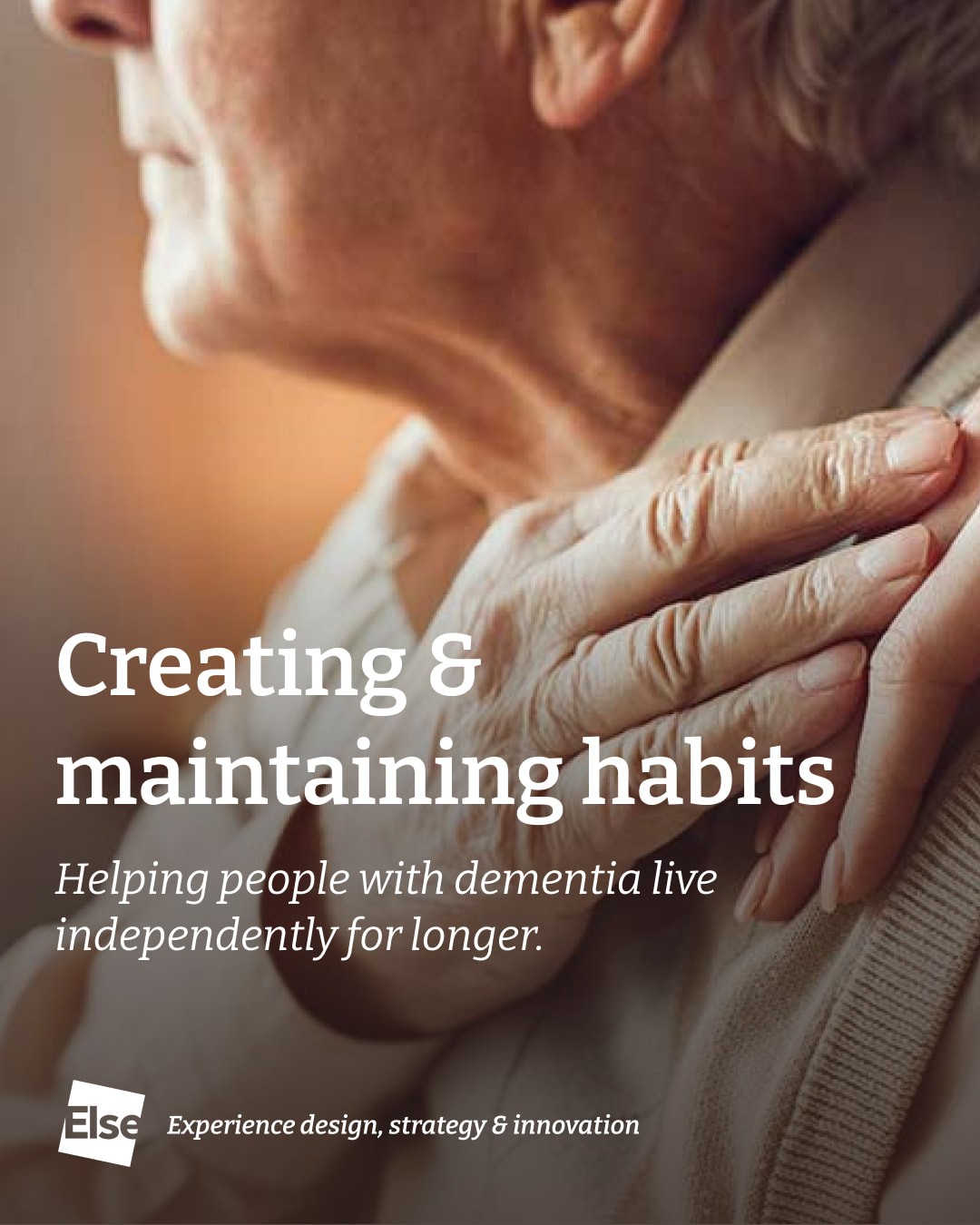

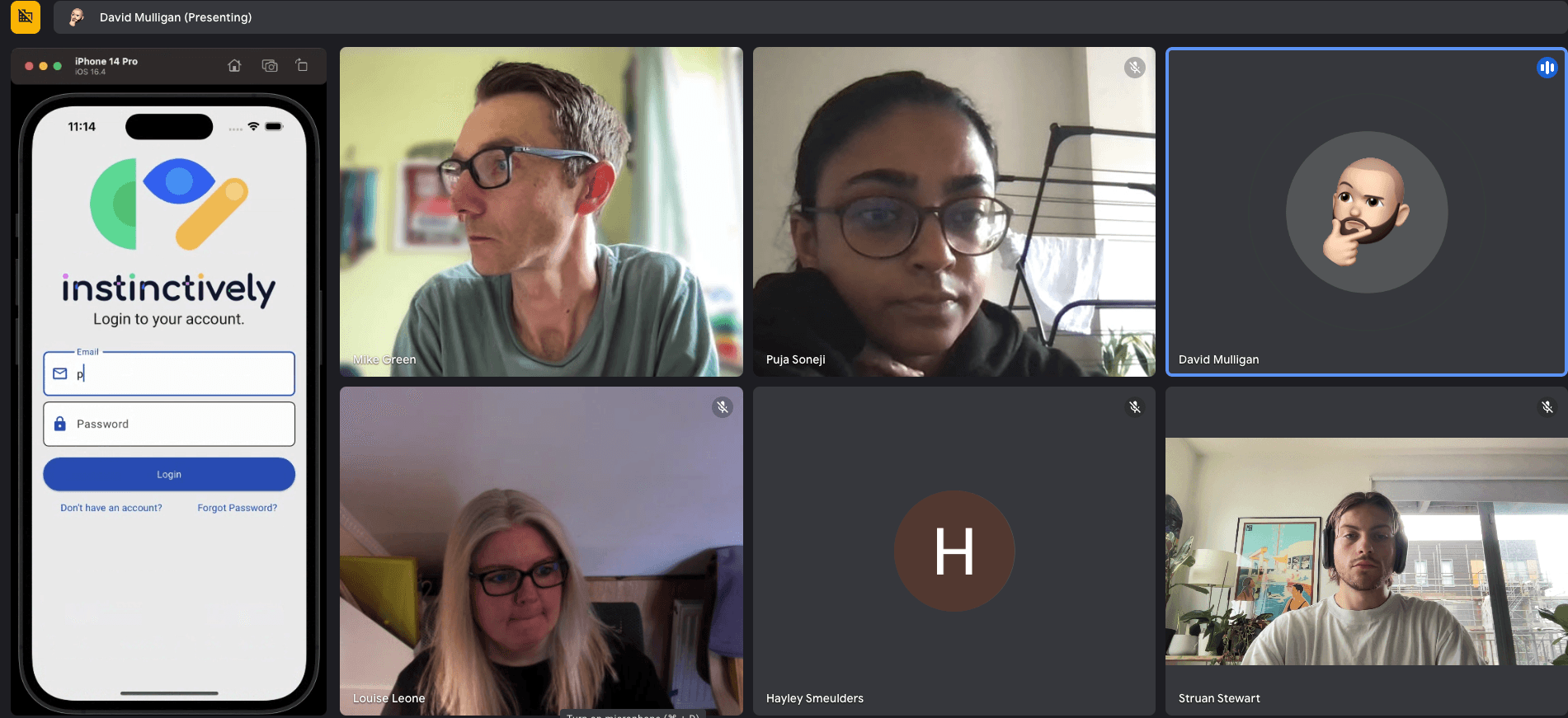

Instinctively has provided my colleague and I with the opportunity to take something from an initial concept through to a developed and tested POC. It has been an invaluable experience in setting up a business and developing skills outside of the UX-focused skills I utilise on a daily basis on client products. Working with a team of developers, handling user data, product `management and pitching at events are all skills that I've been able to develop as a result of working on Instinctively.
As a topic close to home for me as well as millions of people in the UK,
Instinctively has been one of my career highlights. It has been the emotional aspect of the project, speaking to and helping people affected by dementia that has been the most fulfilling part about Instinctively and something I'll strive to incorporate in my work in the future.
Highlights
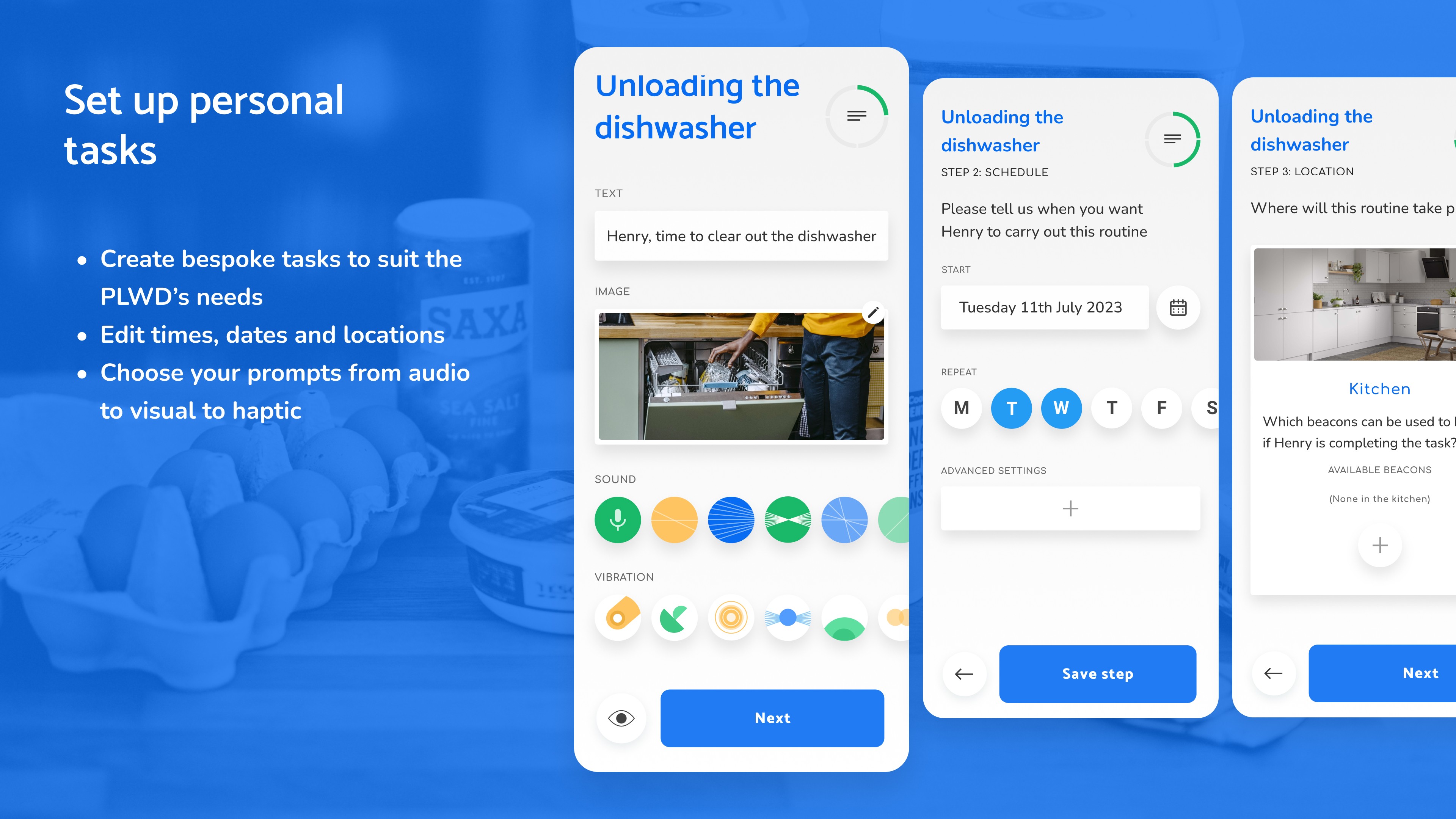

For the second round participants stated the simplistic app design and intuitive functionality resulted in easier following of instructions to complete tasks. The co-design with PLWD and carers to get the app from the first to second round of testing was invaluable and helped to push the app from a POC towards a viable commercial product.
A learning from the second round was that PLWD wanted the autonomy to create and modify their tasks independently of their carers - this provides the flexibility for users to change the timing, frequency and detail involved in specific tasks to accommodate their weekly routines, trips, appointments etc.
Audio cues were also added based on feedback from the first round of testing. Users tended to opt for imagery and audio prompts to guide them through tasks as they found the visual and audio guide more familiar and easier to follow. We also discovered that users would be interested in having voice-integrated assistants to provide more contextual and conversational instructions when completing tasks.
Usability testing - Round 2
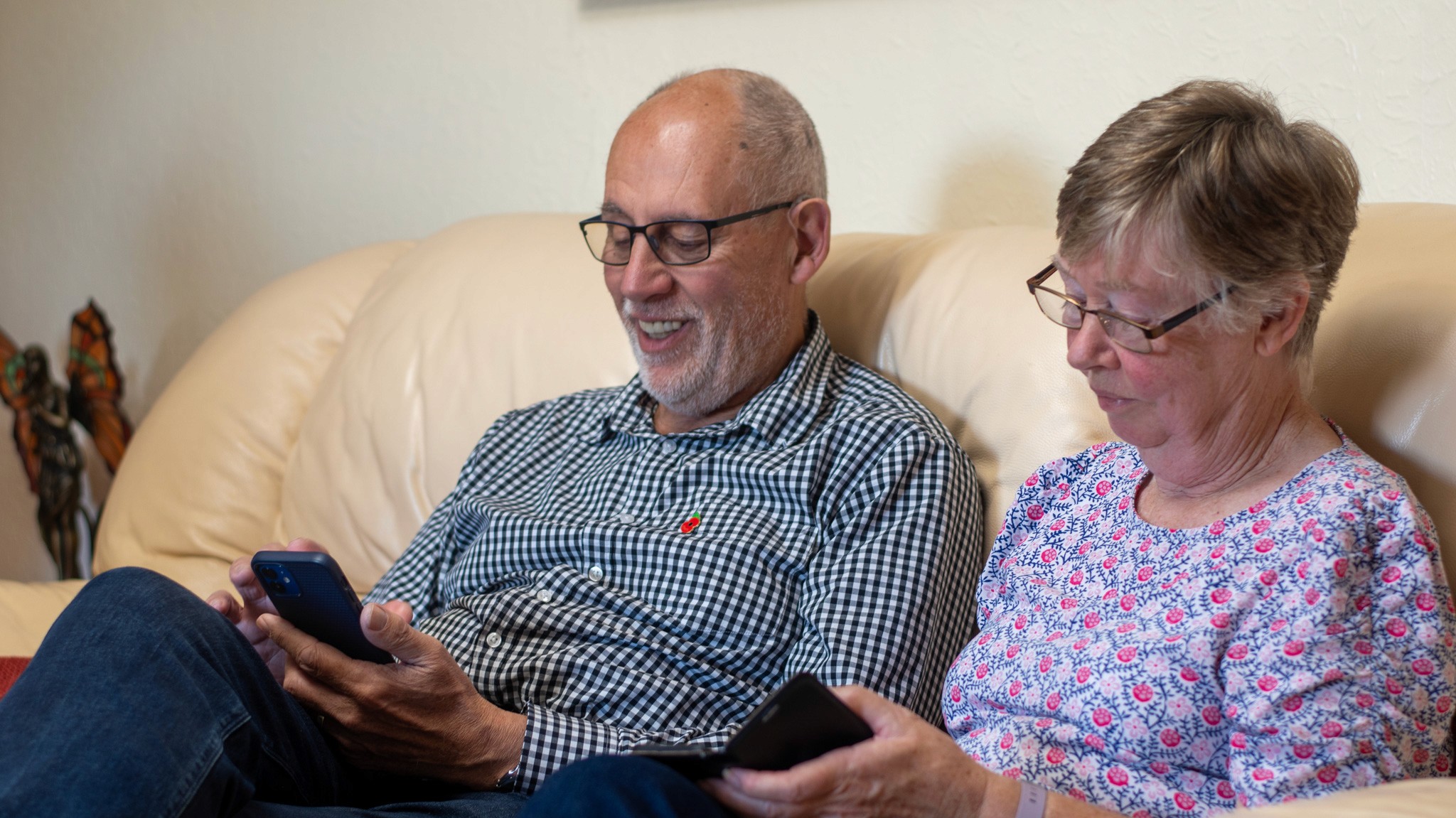

We managed to conduct two 6-week rounds of testing with a selection of participants sourced through online dementia forums.
The participants in the first round ranged in ages and levels of dementia. Some of the users were resistant to using technology as their stage of dementia was beyond that which Instinctively was able to guide them through tasks. There's a stigma around dementia and the loss of autonomy experienced that made some participants hesitant to use the app.
We decided post testing to re-evaluate who the product was suitable for and decided to focus more on people living in the early-stages of the disease who were proactively looking for assistive tools. We adapted the UX, UI, language, accessibility and functionality of the app to accommodate for feedback and made the app feel less patronising to PLWD.
Usability testing - Round 1
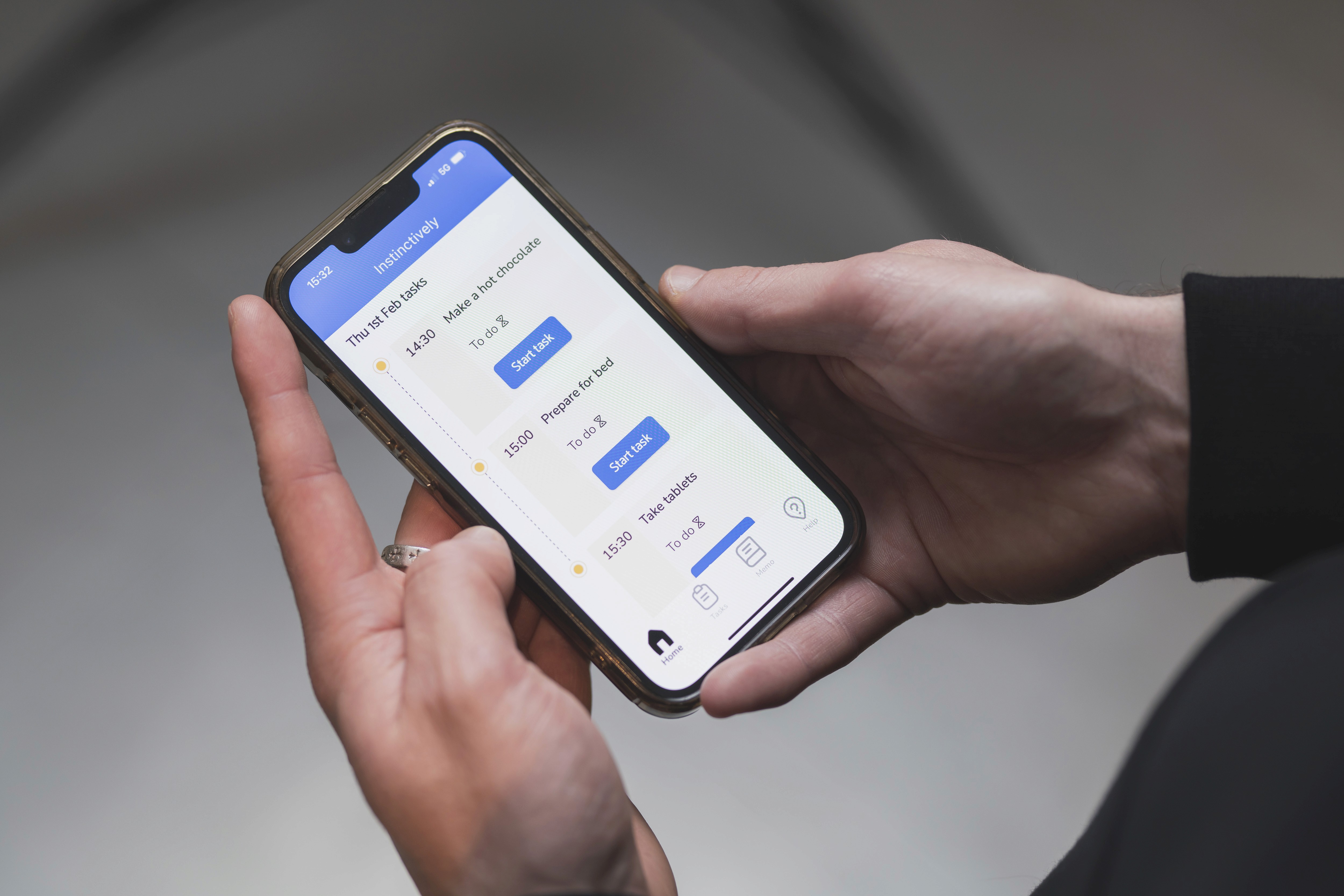

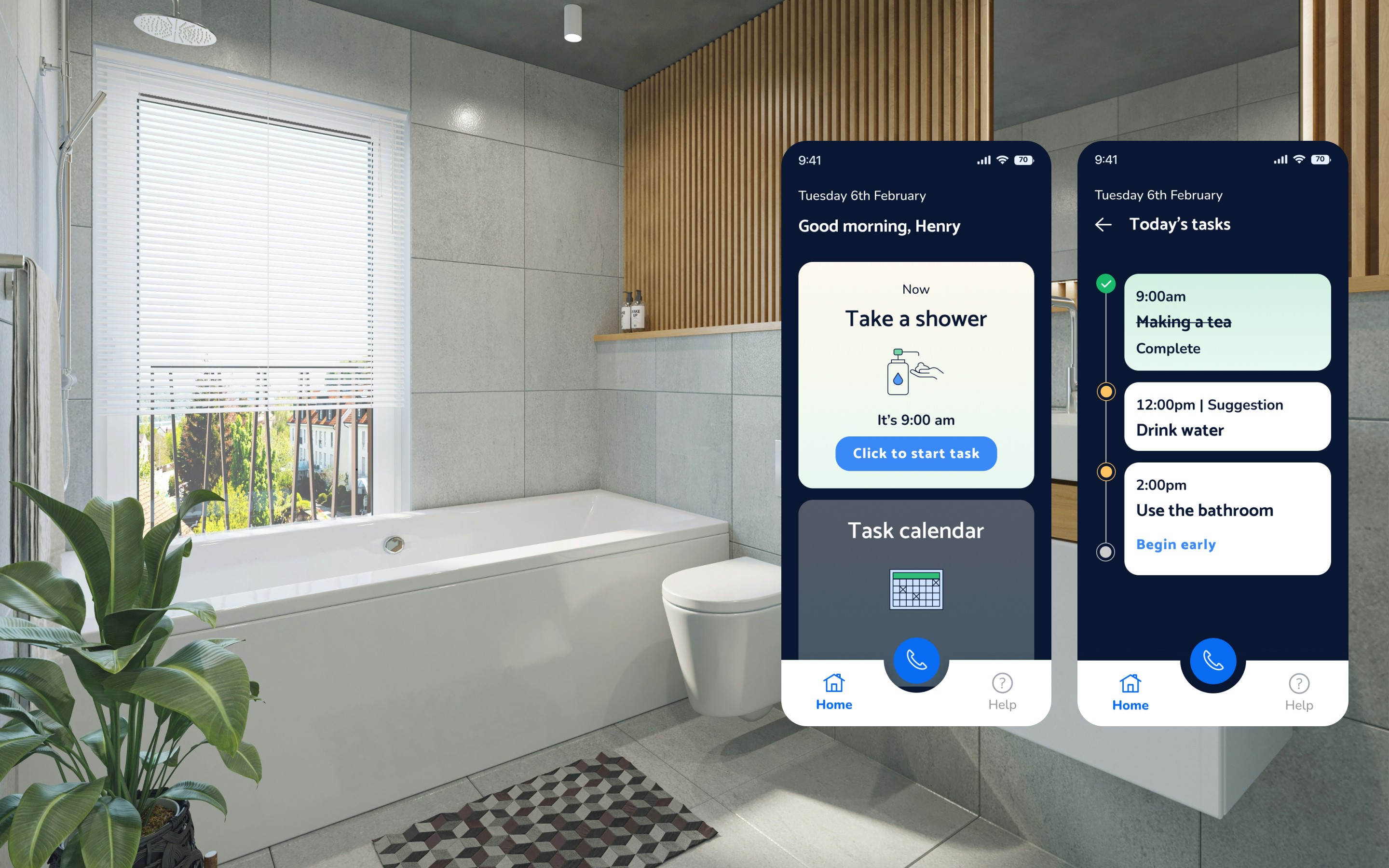
We had many drop-outs between the stages of initial interest and participation in usability testing. The main issues causing these drop-outs was long lead times and too many steps (screener survey, intro video/webinar, data upload, and finally app download via TestFlight). The convoluted process made for a frustrating experience for some individuals. Recruiting in person could alleviate some of this friction.
Experience

We had many drop-outs between the stages of initial interest and participation in usability testing. The main issues causing these drop-outs was long lead times and too many steps (screener survey, intro video/webinar, data upload, and finally app download via TestFlight). The convoluted process made for a frustrating experience for some individuals. Recruiting in person could alleviate some of this friction.
Experience
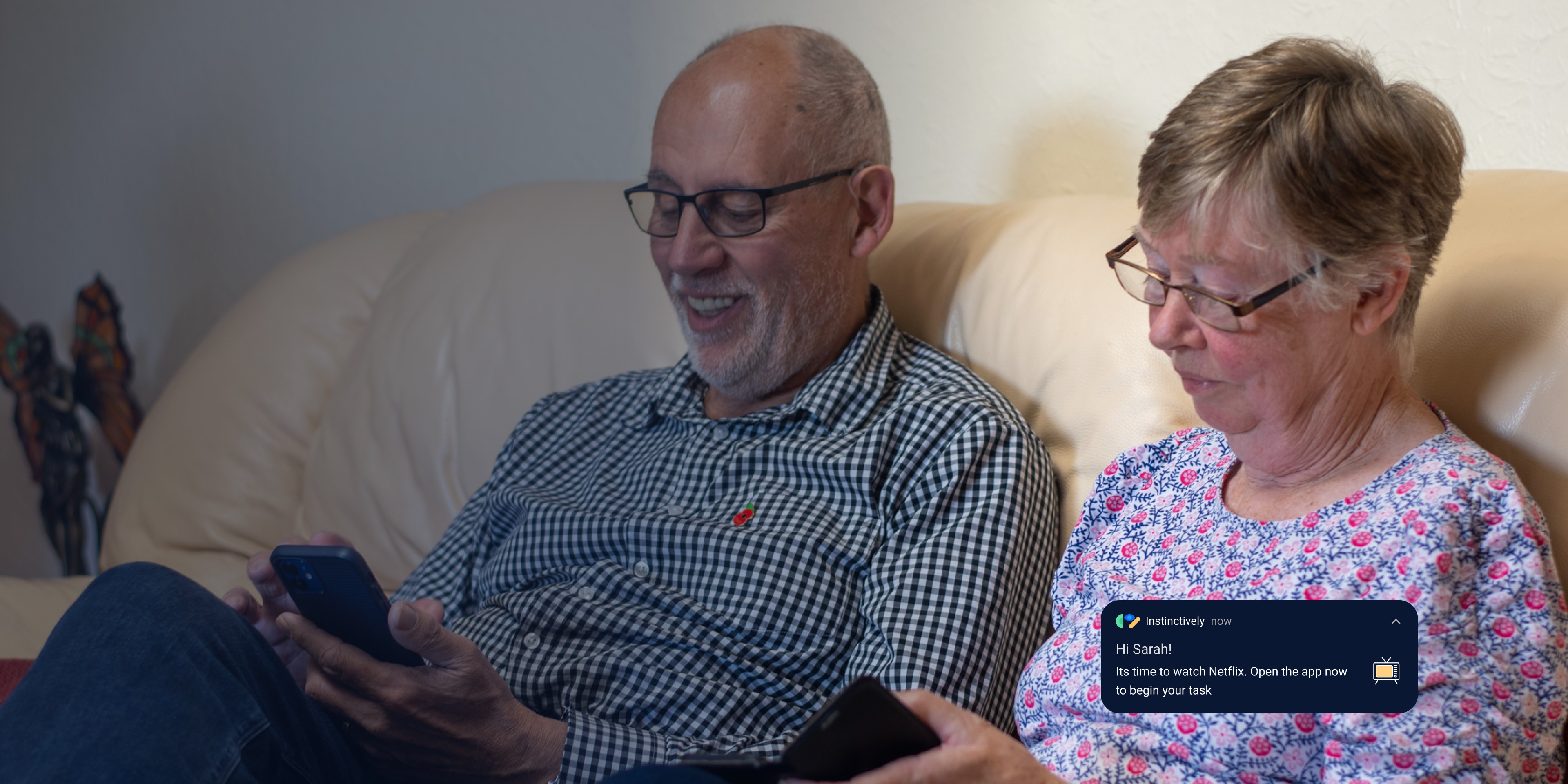

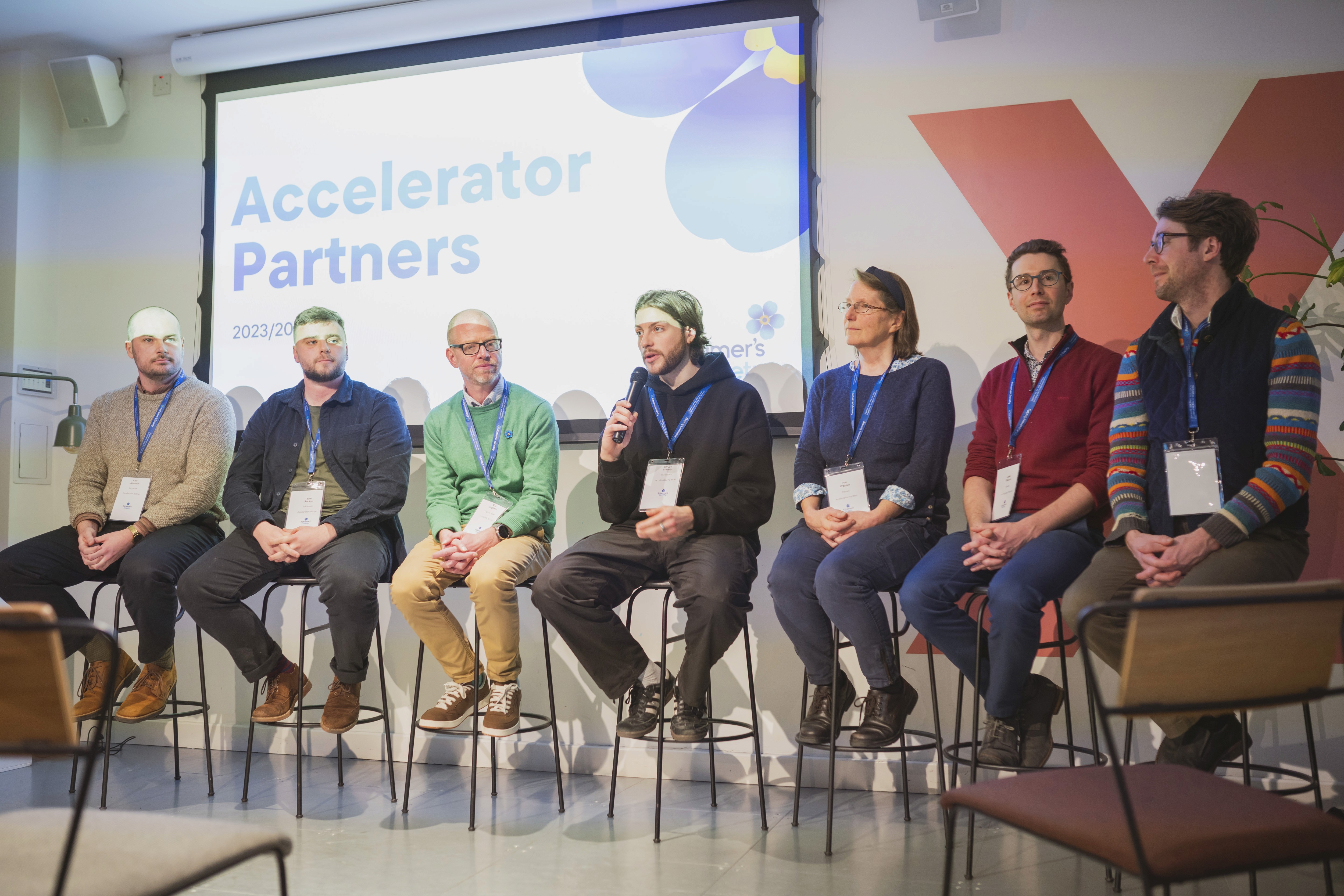

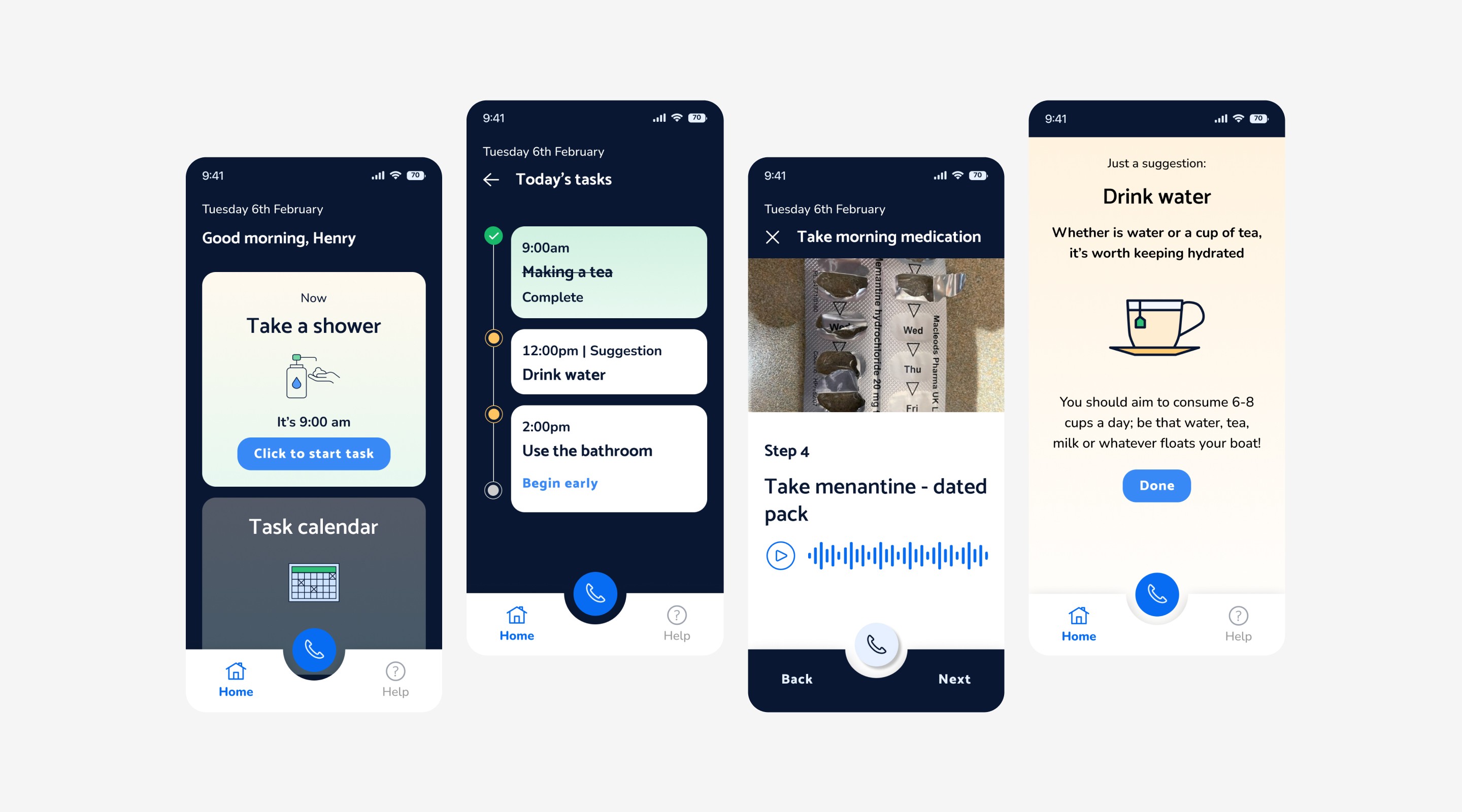

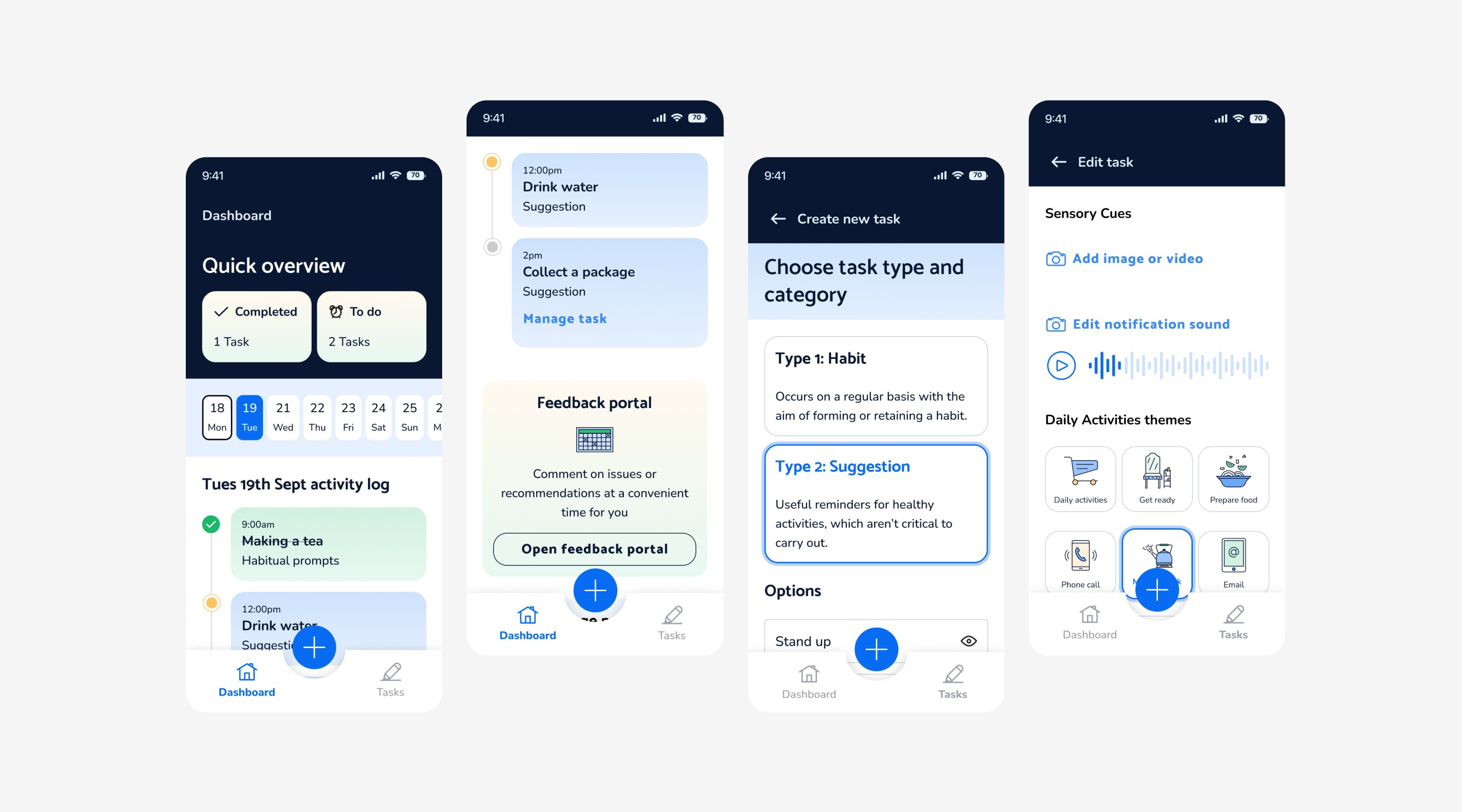

Instinctively is designed to help combat the loss of autonomy experienced by people living with dementia (PLWD). The early stages of the disease can be a difficult period to tackle, especially around the time of medical diagnosis. The cognitive decline experienced by PLWD can bring about complex issues for the individual affected as well as their carers (be that family members or professional carers).
Intro
To create a digital assistive service that provides both PLWD and their carers with apps that help them to manage daily tasks independently. The PLWD's app provides bespoke cues that guide them through completing tasks such as making lunch, taking a shower etc. The carer's app can be used to add, modify and track task completion, allowing them to provide care without needing to be present at all times. This results in a sense of independence for PLWD and reassurance for the carer.
Goals
80k funding
Alzheimer's Society 2023 Accelerator
Testing
2x round of 6 week testing a POC product with people living with dementia
BIMA Awards 2023 Winners
Gold in the Trailblazers and Social Good categories
Bronze in the Health & Wellbeing category




Instinctively is designed to help combat the loss of autonomy experienced by people living with dementia (PLWD). The early stages of the disease can be a difficult period to tackle, especially around the time of medical diagnosis. The cognitive decline experienced by PLWD can bring about complex issues for the individual affected as well as their carers (be that family members or professional carers).
Intro
Goals
To create a digital assistive service that provides both PLWD and their carers with apps that help them to manage daily tasks independently. The PLWD's app provides bespoke cues that guide them through completing tasks such as making lunch, taking a shower etc. The carer's app can be used to add, modify and track task completion, allowing them to provide care without needing to be present at all times. This results in a sense of independence for PLWD and reassurance for the carer.
Instinctively was started as an R&D project in which my colleague and I started exploring the issue dementia poses to people living with the disease and their carers. With personal experience we knew there was a need for an intervention. Using our design and UX experience we decided to focus on a digital service with the aim of creating a POC that we could test with people with lived experience.
In 2022 we applied for the Alzheimer's Society's Accelerator Programme and in 2023 were successful in securing a 12-month partnership and £80k to develop our idea. The aim was to test and prove our concept and to create a commercially available product that could be recommended to older adults by professionals in order to maintain cognitive health and as a means to manage the decline for those post-dementia diagnosis.
Instinctively became the first R&D project at Else to receive external funding and was given the space and resources to use our research to explore a viable product.
Background
Instinctively was started as an R&D project in which my colleague and I started exploring the issue dementia poses to people living with the disease and their carers. With personal experience we knew there was a need for an intervention. Using our design and UX experience we decided to focus on a digital service with the aim of creating a POC that we could test with people with lived experience.
In 2022 we applied for the Alzheimer's Society's Accelerator Programme and in 2023 were successful in securing a 12-month partnership and £80k to develop our idea. The aim was to test and prove our concept and to create a commercially available product that could be recommended to older adults by professionals in order to maintain cognitive health and as a means to manage the decline for those post-dementia diagnosis.
Instinctively became the first R&D project at Else to receive external funding and was given the space and resources to use our research to explore a viable product.
Background





Through Alzheimer's Society we were able to conduct further research and attend events like the annual Alzheimer's Society conference, allowing us to speak to people with lived experience and professionals in the field. We were assigned a panel of PLWD and their carers that we were able to co-design Instinctively with during online and in-person workshops.
Our research led us to the science of Procedural memory - the memory which allows us to act out of instinct and which is the last to us as dementia advances. This paired with our research into habit formation led us to focus on creating ways for PLWD to establish and maintain routines to slow down the progression of dementia.
As a result of the isolation caused by the COVID-19 pandemic we learnt that older adults have become more accustomed to using their phones, tablets and computers to complete tasks such as online grocery shopping and messaging family and friends. This willingness to adopt technology in their daily routines highlighted that the technological barrier of a digital product like Instinctively would be less difficult to overcome as we first thought.
Events and networking




Through Alzheimer's Society we were able to conduct further research and attend events like the annual Alzheimer's Society conference, allowing us to speak to people with lived experience and professionals in the field. We were assigned a panel of PLWD and their carers that we were able to co-design Instinctively with during online and in-person workshops.
Our research led us to the science of Procedural memory - the memory which allows us to act out of instinct and which is the last to us as dementia advances. This paired with our research into habit formation led us to focus on creating ways for PLWD to establish and maintain routines to slow down the progression of dementia.
As a result of the isolation caused by the COVID-19 pandemic we learnt that older adults have become more accustomed to using their phones, tablets and computers to complete tasks such as online grocery shopping and messaging family and friends. This willingness to adopt technology in their daily routines highlighted that the technological barrier of a digital product like Instinctively would be less difficult to overcome as we first thought.
Events and networking

We had many drop-outs between the stages of initial interest and participation in usability testing. The main issues causing these drop-outs was long lead times and too many steps (screener survey, intro video/webinar, data upload, and finally app download via TestFlight). The convoluted process made for a frustrating experience for some individuals. Recruiting in person could alleviate some of this friction.
Experience
We had many drop-outs between the stages of initial interest and participation in usability testing. The main issues causing these drop-outs was long lead times and too many steps (screener survey, intro video/webinar, data upload, and finally app download via TestFlight). The convoluted process made for a frustrating experience for some individuals. Recruiting in person could alleviate some of this friction.
Experience

We had many drop-outs between the stages of initial interest and participation in usability testing. The main issues causing these drop-outs was long lead times and too many steps (screener survey, intro video/webinar, data upload, and finally app download via TestFlight). The convoluted process made for a frustrating experience for some individuals. Recruiting in person could alleviate some of this friction.
Experience
We had many drop-outs between the stages of initial interest and participation in usability testing. The main issues causing these drop-outs was long lead times and too many steps (screener survey, intro video/webinar, data upload, and finally app download via TestFlight). The convoluted process made for a frustrating experience for some individuals. Recruiting in person could alleviate some of this friction.
Experience
We managed to conduct two 6-week rounds of testing with a selection of participants sourced through online dementia forums.
The participants in the first round ranged in ages and levels of dementia. Some of the users were resistant to using technology as their stage of dementia was beyond that which Instinctively was able to guide them through tasks. There's a stigma around dementia and the loss of autonomy experienced that made some participants hesitant to use the app.
We decided post testing to re-evaluate who the product was suitable for and decided to focus more on people living in the early-stages of the disease who were proactively looking for assistive tools. We adapted the UX, UI, language, accessibility and functionality of the app to accommodate for feedback and made the app feel less patronising to PLWD.
Usability testing - Round 1




We managed to conduct two 6-week rounds of testing with a selection of participants sourced through online dementia forums.
The participants in the first round ranged in ages and levels of dementia. Some of the users were resistant to using technology as their stage of dementia was beyond that which Instinctively was able to guide them through tasks. There's a stigma around dementia and the loss of autonomy experienced that made some participants hesitant to use the app.
We decided post testing to re-evaluate who the product was suitable for and decided to focus more on people living in the early-stages of the disease who were proactively looking for assistive tools. We adapted the UX, UI, language, accessibility and functionality of the app to accommodate for feedback and made the app feel less patronising to PLWD.
Usability testing - Round 1
Usability testing - Round 2
For the second round participants stated the simplistic app design and intuitive functionality resulted in easier following of instructions to complete tasks. The co-design with PLWD and carers to get the app from the first to second round of testing was invaluable and helped to push the app from a POC towards a viable commercial product.
A learning from the second round was that PLWD wanted the autonomy to create and modify their tasks independently of their carers - this provides the flexibility for users to change the timing, frequency and detail involved in specific tasks to accommodate their weekly routines, trips, appointments etc.
Audio cues were also added based on feedback from the first round of testing. Users tended to opt for imagery and audio prompts to guide them through tasks as they found the visual and audio guide more familiar and easier to follow. We also discovered that users would be interested in having voice-integrated assistants to provide more contextual and conversational instructions when completing tasks.
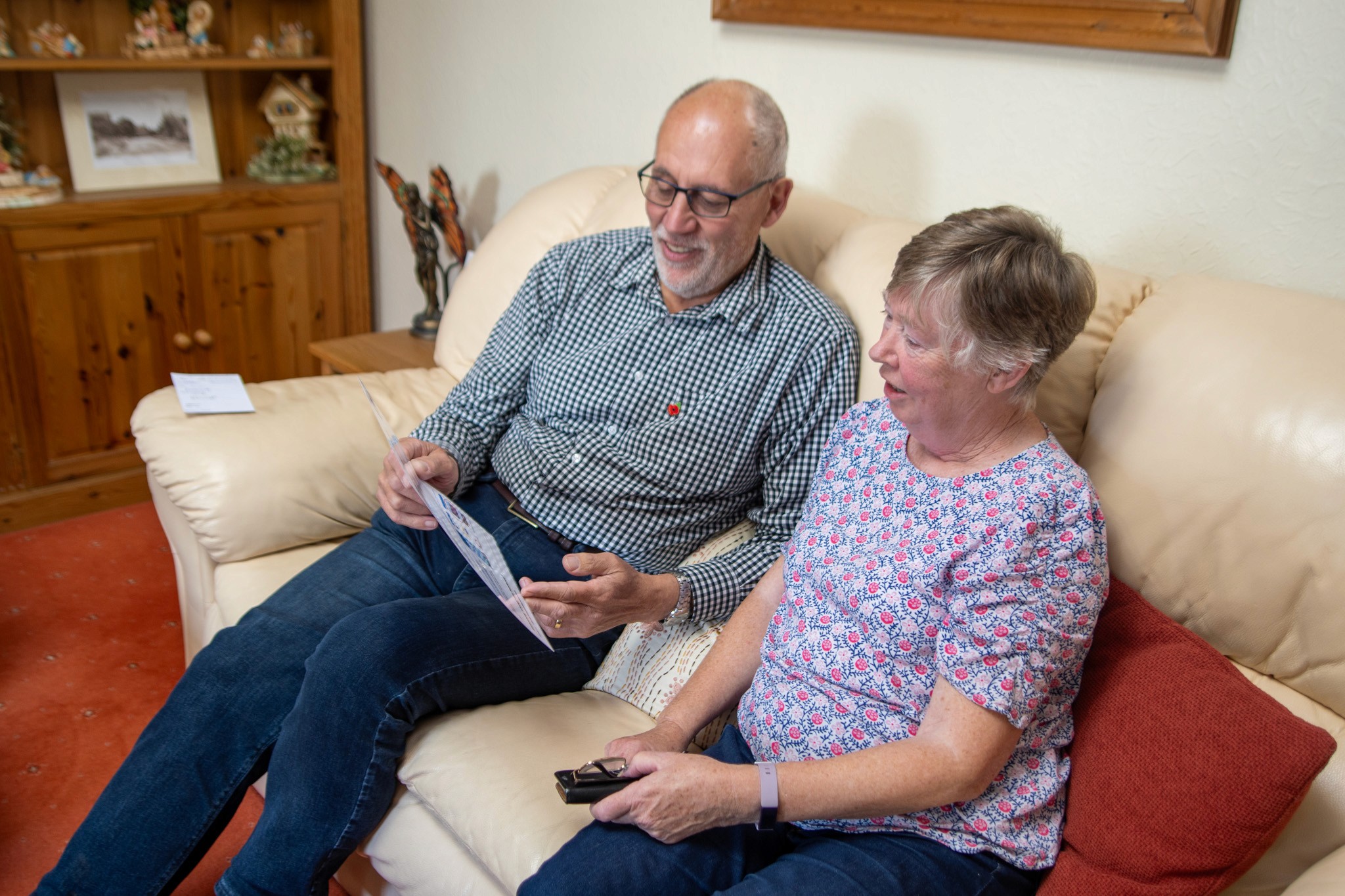



For the second round participants stated the simplistic app design and intuitive functionality resulted in easier following of instructions to complete tasks. The co-design with PLWD and carers to get the app from the first to second round of testing was invaluable and helped to push the app from a POC towards a viable commercial product.
A learning from the second round was that PLWD wanted the autonomy to create and modify their tasks independently of their carers - this provides the flexibility for users to change the timing, frequency and detail involved in specific tasks to accommodate their weekly routines, trips, appointments etc.
Audio cues were also added based on feedback from the first round of testing. Users tended to opt for imagery and audio prompts to guide them through tasks as they found the visual and audio guide more familiar and easier to follow. We also discovered that users would be interested in having voice-integrated assistants to provide more contextual and conversational instructions when completing tasks.
Usability testing - Round 2
The funding from Alzheimer's Society was used to hire a development team to help us bring Instinctively from a working prototype to an app in Test Flight that we could use to conduct tests with PLWD and their carers. This brought another aspect of co-design to Instinctively which helped to flush out functionality issues and create a refined product ready to test. Working with the developers allowed us to learn how to manage a product at a larger scale and pushed Instinctively from a research project into a tangible product.
Product Development








The funding from Alzheimer's Society was used to hire a development team to help us bring Instinctively from a working prototype to an app in Test Flight that we could use to conduct tests with PLWD and their carers. This brought another aspect of co-design to Instinctively which helped to flush out functionality issues and create a refined product ready to test. Working with the developers allowed us to learn how to manage a product at a larger scale and pushed Instinctively from a research project into a tangible product.
Product Development




Instinctively has provided my colleague and I with the opportunity to take something from an initial concept through to a developed and tested POC. It has been an invaluable experience in setting up a business and developing skills outside of the UX-focused skills I utilise on a daily basis on client products. Working with a team of developers, handling user data, product management and pitching at events are all skills that I've been able to develop as a result of working on Instinctively.
As a topic close to home for me as well as millions of people in the UK, Instinctively has been one of my career highlights. It has been the emotional aspect of the project, speaking to and helping people affected by dementia that has been the most fulfilling part about Instinctively and something I'll strive to incorporate in my work in the future.
Highlights




Instinctively has provided my colleague and I with the opportunity to take something from an initial concept through to a developed and tested POC. It has been an invaluable experience in setting up a business and developing skills outside of the UX-focused skills I utilise on a daily basis on client products. Working with a team of developers, handling user data, product management and pitching at events are all skills that I've been able to develop as a result of working on Instinctively.
As a topic close to home for me as well as millions of people in the UK,
Instinctively has been one of my career highlights. It has been the emotional aspect of the project, speaking to and helping people affected by dementia that has been the most fulfilling part about Instinctively and something I'll strive to incorporate in my work in the future.
Highlights



